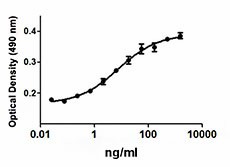- Regulatory Status
- RUO
- Other Names
- Insulin-like growth factor II, somatomedin A

-

MCF-7 cell proliferation induced by human IGF-II.
| Cat # | Size | Price | Quantity Check Availability | ||
|---|---|---|---|---|---|
| 590604 | 25 µg | $159.00 | |||
| 590606 | 100 µg | $323.00 | |||
| 590608 | 500 µg | $886.00 | |||
Select size of product is eligible for a 40% discount! Promotion valid until December 31, 2024. Exclusions apply. To view full promotion terms and conditions or to contact your local BioLegend representative to receive a quote, visit our webpage.
IGF-II is a member of the IGF family, comprised of three members (IGF-I, IGF-II, and insulin). IGF-I and IGF-II share approximately 50% similarity with insulin at the amino acid level. IGF-II is synthesized as a 180 amino acid prepro-IGF-II; pro-IGF-II is processed to its mature, active protein form by glucose regulating protein 94 (GRP94), which possesses chaperone activity towards IGF-II. GRP94 and IGF-II play a key role on muscle differentiation. Seven binding proteins have been described (IGFBP-1 to -7). IGFBPs extend the half life and regulate the availability of the IGFI and IGFII. It has been described that IGFBP3 is the main circulating binding protein for IGFs; in serum, approximately 75% of circulating IGF-I and IGF-II bind to IGFBP3 and the co-carrier acid labile subunit (ALS). IGF-II binds to three receptors, and the binding to IGFIR promotes cell proliferation, survival, differentiation, and migration as well as metabolic function of IGF-II. Embryonic stem cell differentiation into endothelial cells is promoted by the binding of IGF-II to IGFR1. IGF-II binding to IGF-IIR induces internalization and clearing of IGF-II. Osteogenic differentiation and bone formation is enhanced by IGF-II through bone morphogenetic protein-9 (BMP-9). Polymorphisms of IGF-II are associated with obesity, cardiovascular risk factors, and hypertension.
Product Details
- Source
- Human IGF-II, amino acids (Ala25-Glu91) (Accession# X03562.1) was expressed in E. coli.
- Molecular Mass
- The 67 amino acid recombinant protein has a predicted molecular mass of approximately 7.47 kD. The DTT-reduced and non-reduced protein migrate at approximately 10 kD by SDS-PAGE. The N-terminal amino acid is Ala.
- Purity
- >95%, as determined by Coomassie stained SDS-PAGE.
- Formulation
- 0.22 µm filtered protein solution is in 5 mM citric acid, 5 mM NaH2PO4, 0.15 M NaCl, pH 4.0.
- Endotoxin Level
- Less than 0.01 ng per µg cytokine as determined by the LAL method.
- Concentration
- 25 µg size is bottled at 100 µg/mL. 100 µg size and larger sizes are lot-specific and bottled at the concentration indicated on the vial. To obtain lot-specific concentration and expiration, please enter the lot number in our Certificate of Analysis online tool.
- Storage & Handling
- Unopened vial can be stored between 2°C and 8°C for up to 2 weeks, at -20°C for up to six months, or at -70°C or colder until the expiration date. For maximum results, quick spin vial prior to opening. The protein can be aliquoted and stored at -20°C or colder. Stock solutions can also be prepared at 50 - 100 µg/mL in appropriate sterile buffer, carrier protein such as 0.2 - 1% BSA or HSA can be added when preparing the stock solution. Aliquots can be stored between 2°C and 8°C for up to one week and stored at -20°C or colder for up to 3 months. Avoid repeated freeze/thaw cycles.
- Activity
- ED50 = 4 - 20 ng/ml, corresponding to a specific activity of 0.5 - 2.5 x 105 units/mg, as determined by the dose dependent stimulation of MCF-7 cell proliferation.
- Application
-
Bioassay
- Application Notes
-
BioLegend carrier-free recombinant proteins provided in liquid format are shipped on blue-ice. Our comparison testing data indicates that when handled and stored as recommended, the liquid format has equal or better stability and shelf-life compared to commercially available lyophilized proteins after reconstitution. Our liquid proteins are verified in-house to maintain activity after shipping on blue ice and are backed by our 100% satisfaction guarantee. If you have any concerns, contact us at tech@biolegend.com.
Antigen Details
- Distribution
-
Astrocytes, podocytes, hepatocytes, microglia, osteoblast, myoblast.
- Function
- IGF-II induces mitogenesis, proliferation, growth, differentiation, and angiogenesis. IGF-II is a mediator of GH action. IGF-II is involved in neuronal and muscular differentiation as well as organ development. TGFβ1 diminishes IGF-II gene expression and secretion in myoblasts.
- Ligand/Receptor
- IGF-I receptor, Insulin receptor isoform A, and IGF-II receptor (M-6-P-R).
- Cell Type
- Embryonic Stem Cells, Hematopoietic stem and progenitors, Mesenchymal Stem Cells, Neural Stem Cells
- Biology Area
- Cell Biology, Signal Transduction, Stem Cells
- Molecular Family
- Cytokines/Chemokines, Growth Factors
- Antigen References
-
1. Bell GI, et al. 1984. Nature 310:775.
2. Chen L, et al. 2010. J. Bone Miner Res. 25:2447.
3. Ostrovsky O, et al. 2010. Biochim. Biophys. Acta. 1803:333.
4. Gardner S, et al. 2011. Mol. Endocrinol. 25:128.
5. Piecewicz SM, et al. 2012. PLoS One 7:e32191.
6. Church DN, et al. 2012. Oncogene 31:3635.
7. Hale LJ, et al. 2013. J. Pathol. 230:95.
8. Liu ZK, et al. 2012. PLoS One 7:e45224. - Gene ID
- 3481 View all products for this Gene ID
- UniProt
- View information about IGF-II on UniProt.org
